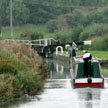The British Waterways ‘top down’ approach to any problem is its biggest failing says South West of England MEP Ashley Fox.
"You can’t have people in London micro-managing maintenance in Trowbridge", he said following a meeting with the Kennet & Avon Canal Trust in Devizes: "We need to ensure that the new charity gives greater power to local people."
He expressed concern that the ‘New British Waterways Charity’ will continue the tradition of centralised control currently practised by British Waterways, bypassing an opportunity for greater community involvement in the management of Britain’s waterways which are a key part of our industrial heritage.
He paid tribute to the work done in the past by the Trust and commented: "The Kennet & Avon Canal Trust is a first rate example of what can happen when local organisations are given control. They have done wonders in linking National Lottery funding with volunteer, council and business groups and have, over the last decade, restored the canal to the wonder that it is today.
"Our waterways are part of our history and still used today by millions of people across the South West in a whole variety of ways, from fishing and boating, to walking and cycling. It is only right that those who use our canals should decide on their future.
Fox now plans to write to the Minister and urge that the excellent work by the Trust and its partners which has achieved so much be used as the model for improving our inland waterways into the future.
Centralised autocracy of BW must be replaced says Trust
The K&A Canal Trust has expressed serious concerns about the short timescale for the intended implementation which it says: "Has not allowed the many important lessons learned from the pioneering work on the Kennet and Avon to be adequately reflected in the current proposals."
The Trust has endorsed the concept of giving waterway users and the communities that live alongside them greater involvement in how they are managed. "Unfortunately" they say, "the highly centralised management structures, largely reflecting the current worst features of BW, put forward in the consultation document are the opposite of these worthy principles.
"A new NWC requires a totally new organisational structure. It also needs a totally new management culture which replaces the centralised autocracy of BW by cooperation with partner organisations and respect for their views. The current negative perception of BW among many waterway users is not a good foundation for a new NWC."
Trusts taken for granted
The Trust response is critical of BW staff who are saying: "When we take over" in their dealings with local canal societies increasing concerns that the cooperation or extinction of current societies is being taken for granted.
BW donations prediction 'optimistic'
The K&A Canal Trust, which has suffered disasterous fund raising efforts in the recent past, sent an email to its members earlier this year describing 2010 as a 'financial nightmare' for the Trust and described its funding raising as "an absolute washout". In its submission it says that the predicted level of donations to the NWC appears optimistic and:"Whereas the proposed level of the Government Funding Contract is significantly lower than that provided to BW in recent years lack of any reference within the Consultation Document to the future of the waterways should the finances fail to meet DEFRA expectations is of serious concern. There is no Plan B."
National Trust comparison — misleading
The K&A Canal Trust believes that the implied comparison with the National Trust can be misleading because the National Trust embraces properties with a viable financial legacy for on-going operation. In contrast, the NWC will inherit the legacy of an underfunded BW with a backlog of deferred maintenance.
The Trust says
- The NWC must, in its Charitable Purposes, mention responsibility for protecting the heritage of the Waterways.
- The NWC must remain bound to provide public access to information, otherwise it will become a law unto itself. Keeping some aspect of the organisation publicly accountable matches its on-going stewardship of this strategic, public resource.
Lack of accountability
"The fundamental question of accountability of the new organisation deserves careful examination", says the report, "before this great national asset passes into the hands of a less accountable board of charitable trustees. The new organisation must be both transparent and open."
The Trust's complete 3,000 word response to the Defra consultation can be found on their Website at: New Era for the Waterways






















